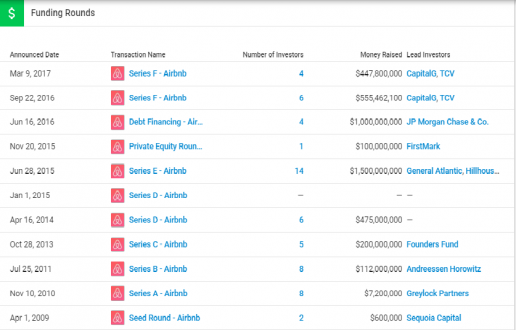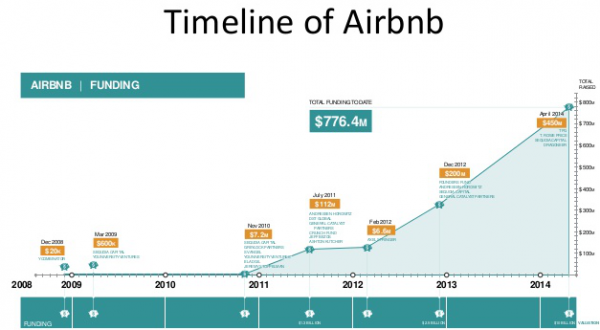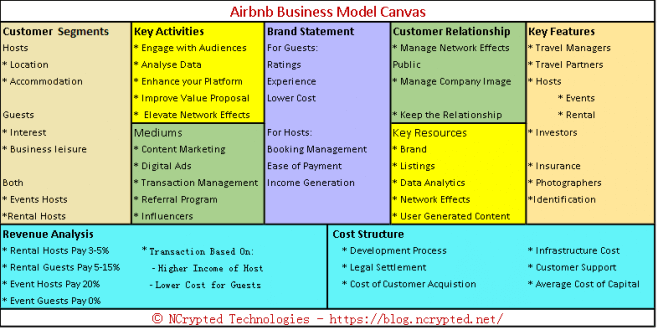The howling success of Airbnb has managed to catch the eyes of people. Long before Airbnb swayed people to sleep in other homes and became a billion-dollar company, it was, at first, just an idea to make extra cash and pay the founders’ rent. But look at what it has become now! It has revolutionized the way people travel today. Airbnb business model is unique and has a mixture of being a marketplace, a P2P shared economy, and an aggregator. Let’s break this down.
This article covers the business model analysis of Airbnb, how it makes money, what is its business model canvas, revenue model, and market strategies. To understand the basics of what Airbnb is and for a beginner’s guide on how it works and how to use it, refer to our separate article.
How does Airbnb Work?
Airbnb is an online marketplace associating travelers with hosts. On one side the platform empowers individuals to list their accessible space and gain additional income as rent. On the other, Airbnb empowers guests (travelers) to book one-of-a-kind home remains from local hosts, sparing them cash and allowing them to collaborate with local people. Obliging the on-request travel industry, Airbnb is available in more than 190 countries.
How Airbnb Got Started?
Airbnb founders Joe Gebbia and Brain Chesky just moved from New York. They were having trouble paying the rent, so they decided to look for a way to earn some cash. They detected that all hotel rooms in the city were somehow booked, as some local industrial design conferences drew in a lot of visitors.
The youngsters observed an opportunity. They bought some airbeds and hastily put up a site named “AirBed & Breakfast”. The setup was simple. It was to offer visitors a place to get some well-needed shut-eye and breakfast in the morning. The idea was born! Soon after, Technical Architect, Nathan Blecharczyk joined the team as the third co-founder and together the trio made wonders.
How Airbnb raised its initial funding
The Airbnb authors figured out how to make an incredible $30,000m selling the Obama O’s and Cap’n McCains.
Airbnb raised its initial funding, $20,000 from Y Combinator, one of the world’s top startup accelerators. They were as yet making just $200 a week and chose to utilize the cash to go to New York, their greatest market, to meet their clients. They find that the fundamental issue is that the photos of most postings aren’t great. They purchase a camera and go way to-way to take better photos of the postings.
It’s January 2009 and the hatchery welcomes the three founders to join its winter session for three months of preparation. In the meantime, Paul Graham at Y Combinator tries to persuade financial investor Fred Wilson to put resources into Airbnb. Incredibly, you can read the real email discussion that Graham and Wilson had.
Wilson chose to pass, missing a major opportunity for what might have been a colossal victory. After meeting Chesky and co, he solicited them to leave a crate from the well-known oats. The container now fills in as an update for Wilson not to commit this error once more.
Airbnb Funding Rounds and Airbnb Investors
Airbnb was established on 1 August 2008 and in a limited capacity to focus time it developed as an innovative artful culmination. Having gotten a gigantic funding of $2.3 Billion from 31 distinct investors, Airbnb is a piece of the billion-dollar club. Here are a few fascinating certainties about Airbnb.
Founders: Nathan Blecharczyk, Joe Gebbia, and Brian Chesky.
Status: Now a listed company on NASDAQ: ABNB
Airbnb valuation: $100 Billion (As of May 2024)
Airbnb is available in 34,000+ urban areas crosswise over 190+ nations.
Having 1.2 Million postings, the organization has served more than 35 Million visitors.
Headquarters: San Francisco, California, USA.
140,000+ individuals remain at an Airbnb-listed place regularly.


Airbnb Business Model
Decoding the Engine Behind the Global Hospitality Disruptor
Airbnb has transformed the way people travel, offering unique accommodations and experiences in over 220 countries and regions. But have you ever wondered how Airbnb makes money? Let’s delve into the intricacies of Airbnb’s business model and explore the revenue streams that power this hospitality disruptor.
Commission from Hosts and Guests:
Airbnb’s primary revenue stream comes from charging commissions on bookings made through its platform. Hosts pay a percentage of the booking subtotal as a service fee, while guests pay a guest service fee ranging from 0% to 20% of the booking subtotal, depending on the reservation subtotal and other factors.
Service Fees:
In addition to commissions, Airbnb generates revenue through service fees on certain reservations. These fees may include cleaning fees, extra guest fees, and other ancillary charges that hosts can set for their listings. Airbnb collects these fees and retains a portion as revenue.
Experiences:
Airbnb offers a range of experiences hosted by locals, from cooking classes to guided tours and outdoor adventures. Hosts set the price for their experiences, and Airbnb charges a service fee for each booking. This additional revenue stream diversifies Airbnb’s offerings and enhances its value proposition for travelers.
Airbnb Plus and Airbnb Luxe:
Airbnb Plus and Airbnb Luxe are premium tiers offering high-end accommodations and luxury experiences to discerning travelers. Hosts in these tiers must meet specific criteria and standards set by Airbnb, and in return, Airbnb charges higher commission rates on bookings made through these tiers, generating additional revenue.
Advertising and Promotions:
Airbnb offers advertising and promotional opportunities for hosts to increase the visibility of their listings and attract more guests. Hosts can pay for sponsored placements or featured listings to improve their search ranking and exposure on the platform. Airbnb generates revenue from these advertising and promotional services.
Host Services:
Airbnb provides a range of host services and tools to help hosts manage their listings, communicate with guests, and streamline the booking process. These services may include professional photography, listing optimization, pricing suggestions, and guest communication tools. Hosts pay fees for these services, generating revenue for Airbnb.
Partnerships and Collaborations:
Airbnb has forged strategic partnerships with other companies and organizations to expand its reach and offerings. This includes collaborations with travel agencies, airlines, and destination marketing organizations to promote Airbnb listings and provide integrated travel experiences. These partnerships may involve revenue-sharing agreements or referral fees, contributing to Airbnb’s overall revenue.
Airbnb’s business model is a complex ecosystem of revenue streams that leverage the power of its platform to connect hosts and guests around the world.
By charging commissions, and service fees, and offering premium tiers and additional services, Airbnb has built a sustainable business model that drives revenue while providing value to both hosts and guests. As Airbnb continues to innovate and expand its offerings, its business model will likely evolve to meet the changing needs of travelers and hosts in the dynamic hospitality industry.
Let’s understand Airbnb business model through its different user segments.
Airbnb User Segments
Guests:
Guests are travelers or the general population who book the available accessible spaces from the neighborhood.
Guests have the choice to scan for a property by browsing them as indicated by rent (price per night, week, or month), amenities, other conveniences given, area, and so on. Guests can book a space by paying through the Airbnb entrance.
Airbnb charges a % fee to the guests upon booking along with a convenience fee.
Hosts:
Hosts are the users who own or manage the given property and need to profit by renting it out based on their accessible space.
They can make a posting for their property on Airbnb, include property points of interest, and set their particular lease, registration, registration time, and so forth.
Any business needs clients – A Customer’s Perception is any Business’ Reality. A business exists in the market just when the business takes care of the client’s demand. Take a gander at what the group frantically needs – influence it to center to expand on your business – by that way locate your arrangement of clients, make a reply to your client’s answers and that is how Airbnb revealed its plan of action.
Airbnb Business Model is a twosome stage that serves to shackle clients who are watchful for a not-too-bad space to lease amid get-away and dealers who are persuaded to impart their homes with an expectation to add additional cash to their pocket. So taking a gander at the administration demonstrates – that the business manages two distinctive client sections, the visitors and the hosts while the business happens just if both client fragments are there.
Hosts can acknowledge or dismiss a booking in the wake of perusing the audits of the traveler or in the wake of experiencing his social profiles.
Airbnb charges the hosts a % of the booking amount as its fee.
Independent Photographers:
Airbnb has a tremendous system of independent picture takers in every single real city of the world who go to an area and snap superior quality photos of the property.
The astounding photos get more reactions and the independent picture takers are paid via Airbnb specifically.
Now, let’s understand the typical Airbnb business model canvas.
Airbnb Business Model Canvas
The plan of action canvas of Airbnb clarifies the key accomplices, key exercises, key assets, incentives, client relations, channels, and client portions of Airbnb. Alongside this, the cost structure and income floods of Airbnb have likewise been recorded. Look at it:

Airbnb’s Value Proposition

“Cost is the thing that you pay, Value is the thing that you get”
Warren Buffet
This quote from the legendary investor says everything. Offer equivalents to items or administrations that create an incentive for a specific client fragment.
Having the effect in the business among the contenders is the place you make an incentive to your clients. The center of business methodology ought to be straightforwardly relative to the client’s offer with a steady arrangement of the procedure and capacities. A correct incentive setup prepares your business to emerge and makes it a purpose behind your business to be the client’s decision. From configuration, to benefit, to help, to evaluating, and so forth – anything done to persuade clients – is about incentive.
Understanding Airbnb’s Aggregator Business Model
In the disguise of a P2P sharing economy, Airbnb actually works on an Aggregator Business Model, like Uber or the Indian startup Oyo Rooms. It doesn’t have an inventory plan of action like the conventional lodging networks, for example, Marriott, Hilton, and so forth. The conventional hotel chains need to put millions into the building and keep up their properties (inventory). Although many hotel chains have lately started following this inventory-lite trend, they still aren’t completely inventory-lite.
Airbnb’s key assets are individuals and in this way does not need to do any of that. This empowers it to become staggeringly quick at zero minimal cost.
Individuals can list their accessible space on the stage and acquire additional cash from what they get as leases for their properties. As a stage, it likewise empowers voyagers to associate with the neighborhood and book home remains rather than costly lodgings, sparing them cash and giving them “a chance to live like a nearby”. Individual profiles and rating/checking on frameworks enable voyagers to settle on an educated choice about the hosts and what is on offer. Has too can pick who to lease their space to. These assist in assembling trust and notoriety in the group.
Other than the voyagers and hosts, Airbnb’s plan of action additionally incorporates a tremendous system of independent picture-takers in every single real city of the world. They visit a property and get top-quality photos of the property. These top-notch photos enhance the snap rate and help in getting more reactions. Airbnb pays these picture takers specifically.
Interesting Read: How much does it cost to build a website & app like Airbnb?
How is Airbnb Business Model different from Uber?
At first glance, Airbnb and Uber both utilize the Aggregator Business Model yet the distinctions emerge when burrowed further. Uber has streamlined the ride-hailing process, lessening the vulnerability of when and what kind of auto would arrive. Uber’s business model is to such an extent that it goes about as a broker between the drivers and riders guaranteeing a normal level of administration.
This is not quite the same as Airbnb’s plan of action which blossoms with discoverability. The level of administration isn’t institutionalized. The hosts are allowed to pick any posting of their decision in the wake of experiencing its audits. Uber too has appraisals for the two drivers and riders, nor are they as detailed as those on Airbnb nor can a client pick a specific driver of his/her decision. The most Uber can do is bar a driver or rider if his/her evaluations are too low. Uber pays its driver accomplices through a settled rate of commission for each ride.
Read more: Uber business model
How does Airbnb Make Money?
The hosts list their properties on Airbnb through its website or app and the guests can browse the properties and make a booking online. Airbnb takes a commission on the booking from both the hosts and the guests.
Commission from Hosts/Owners
Airbnb deducts a level 10% commission from has for each reservation done through the stage. Has likewise need to pay a 3% charge for the preparation of the installments of the visitors.
Commission from Travelers/Guests
6-12% of the booking sum is set as an administration charge via Airbnb for explorers for each affirmed booking. This expense is non-refundable.
Airbnb reasons that individuals can spare cash on booking charges on the off chance that they book in expansive numbers. This was a brief of how Airbnb makes money.
Airbnb Marketing Strategies
Airbnb Marketing Strategies: Unveiling the Tactics Behind the Hospitality Giant’s Success
Targeted Digital Marketing:
Airbnb employs targeted digital marketing strategies to reach potential guests and hosts across various online channels. Through data-driven advertising campaigns, Airbnb targets users based on their demographics, interests, and browsing behavior, ensuring that its messaging resonates with the right audience segments. This targeted approach maximizes the effectiveness of Airbnb’s marketing efforts and helps drive user acquisition and engagement.
Content Marketing and Storytelling:
Airbnb leverages the power of storytelling to connect with its audience and showcase the unique experiences available on its platform. Through compelling content such as blog posts, videos, and user-generated stories, Airbnb highlights the personal narratives of hosts and guests, inspiring others to book accommodations and experiences. By tapping into the emotional appeal of travel and exploration, Airbnb cultivates a sense of community and belonging among its audience, driving brand loyalty and engagement.
Influencer Partnerships:
Airbnb collaborates with influencers and celebrities to amplify its brand message and reach new audiences. By partnering with influencers who align with its brand values and target demographics, Airbnb leverages its social media reach and influence to promote its offerings and generate buzz around its platform. These strategic partnerships help Airbnb expand its reach, build credibility, and attract a diverse range of users to its platform.
User-generated Content and Reviews:
User-generated content plays a significant role in Airbnb’s marketing strategy, with reviews and testimonials serving as powerful social proof of the platform’s value and reliability. By showcasing authentic user experiences and feedback, Airbnb instills trust and confidence in potential guests, encouraging them to book accommodations and experiences with confidence. Airbnb actively encourages hosts and guests to share their stories and reviews, amplifying the reach of its marketing efforts and fostering a sense of transparency and authenticity.
Localization and Personalization:
Airbnb adopts a localized approach to marketing, tailoring its messaging and offerings to specific geographic regions and cultural contexts. By understanding the unique preferences and needs of different markets, Airbnb can deliver personalized experiences and recommendations that resonate with local audiences. Whether through localized content, language support, or region-specific promotions, Airbnb ensures that its marketing efforts are relevant and impactful across diverse markets worldwide.
Strategic Partnerships and Cross-promotions:
Airbnb forms strategic partnerships with travel brands, tourism boards, and other businesses to expand its reach and enhance its offerings. Through cross-promotional campaigns and collaborations, Airbnb taps into complementary audiences and markets, driving mutual benefits for all parties involved. These partnerships help Airbnb strengthen its brand presence, attract new users, and position itself as a leader in the global travel industry.
Airbnb’s marketing strategies are a testament to its innovative approach to connecting hosts and guests and creating memorable travel experiences. By leveraging targeted digital marketing, compelling storytelling, influencer partnerships, user-generated content, localization, and strategic partnerships, Airbnb continues to disrupt the hospitality industry and redefine the way people travel and experience the world.
As Airbnb continues to evolve and grow, its marketing strategies will undoubtedly play a crucial role in driving its success and shaping the future of travel.
Key Challenges and Solutions
Put stock in Problem
Although Airbnb has revolutionized the way accommodations are booked worldwide, the most concerning issue faced by guests and hosts using Airbnb is still the confide-in factor. After all, giving your space to a stranger (guest) and living with outsiders at their place as a guest is still not an ‘obvious’ thing to many.
In any case, Airbnb has a confirmation procedure set up for each host and Traveler on its platform. Aside from the confirmation identification, Airbnb additionally propels individuals to join with their Facebook account or if nothing else interface it with their Airbnb representing better straightforwardness.
This isn’t all. If something turns out badly, at that point, Airbnb has a protection strategy.
Traveler Retention
Another issue being looked at via Airbnb is the maintenance issue. To develop, the organization needs to hold its Travelers with the goal that they don’t pick an inn on their next vacations. To hold them, Airbnb gives offers, special codes, and credits to visit travelers. As an answer to this issue, Airbnb likewise sends such advancements to has as to rouse them to take a vacation and remain in an Airbnb at their most loved goal.
Local Restrictions
Numerous urban communities and nations have begun bringing new controls against the leasing of properties as they are being abused to abstain from paying expenses.
Imitators
Neighborhood rivalry is a major risk and since nearby players comprehend the way of life better, they have a slightly preferred standpoint. They likewise have the primary mover advantage on the off chance that they react rapidly to Airbnb’s extension.
The Future of Airbnb
Airbnb is now a $100 dollar organization and is certain to continue redefining the way we travel and book accommodations. Having a listing in 190+ nations over the world, it is currently focusing on additionally expanding the everyday exchanges on its platform. With its exponential revenue rise post-pandemic, the special plan of action Airbnb has even turned out to be more grounded as individuals lean toward remaining at an Airbnb instead of a lodging.
How to Start a Vacation Rental Business like Airbnb?
After looking at such big numbers, investing in this niche will empty your pockets, you say! Well, don’t worry. It’s not like that. Check out BistroStays, it can help you to get started with your own vacation rental website like Airbnb for less than $5K!
Tell us What You Think!
Would you like to share your thoughts on this article? Let us know what you think in the comment section below.



Great insights into airbnb business model. Glad I came across this article while searching for it. Do you guys provide consulting for bnb startups?
Greetings from NCrypted. I’m glad you found the article to be insightful. Yes, we do provide consulting for bnb startups. Kindly email your brief to sales@ncrypted.com so that one of our business executives will get in touch with you to discuss more on this.
[…] you know? Airbnb business model Also read: Cost to develop an app like […]
[…] Airbnb Business Model […]
[…] Airbnb Business Model […]
[…] Airbnb Business Model […]
[…] Airbnb Business Model […]
[…] Airbnb Business Model […]
What is the process to go for Airbnb clone site from any company?